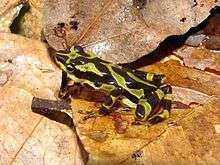Atelopus spurrelli
Atelopus spurrelli is a species of toad in the family Bufonidae. It is endemic to Colombia and occurs in the Pacific lowlands and foothills of the Cordillera Occidental.[1][2][3] The specific name spurrelli honors Herbert George Flaxman Spurrell, a British physician and zoologist.[4] Common name Condoto stubfoot toad has been coined for this species.[2]
| Atelopus spurrelli | |
|---|---|
 | |
| Scientific classification | |
| Kingdom: | Animalia |
| Phylum: | Chordata |
| Class: | Amphibia |
| Order: | Anura |
| Family: | Bufonidae |
| Genus: | Atelopus |
| Species: | A. spurrelli |
| Binomial name | |
| Atelopus spurrelli Boulenger, 1914 | |
Description
Male Atelopus spurrelli grow to a snout–vent length of 26 mm (1.0 in) and females to 34 mm (1.3 in). The body is elongated. The head is as long as it is wide. Skin is smooth to finely granular. The dorsum dark brown to black and has irregular yellow to olive green spots. The belly uniformly cream to white with small brown spots.[5]
Skin of Atelopus spurrelli contains tetrodotoxin, although less than Atelopus spumarius and A. varius.[6]
Habitat and conservation
Atelopus spurrelli occurs in primary and secondary tropical humid forest at elevations of 50–900 m (160–2,950 ft) above sea level. It lives in leaf-litter near water, and presumably breeds in streams. It can be locally common, but has also declined or disappeared from many sites where chytridiomycosis has been reported. It can also be locally threatened by deforestation caused by agricultural development, illegal crops, illegal mining activities, and logging. Its range includes several protected areas, e.g., Utría National Park and El Amargal Nature Reserve.[1]
References
- IUCN SSC Amphibian Specialist Group (2017). "Atelopus spurrelli". IUCN Red List of Threatened Species. 2017: e.T54556A49538284. doi:10.2305/IUCN.UK.2017-3.RLTS.T54556A49538284.en.
- Frost, Darrel R. (2018). "Atelopus spurrelli Boulenger, 1914". Amphibian Species of the World: an Online Reference. Version 6.0. American Museum of Natural History. Retrieved 19 July 2018.
- Acosta Galvis, A. R. & Cuentas, D. (2017). "Atelopus spurrelli Boulenger, 1914". Lista de los Anfibios de Colombia V.07.2017.0. www.batrachia.com. Retrieved 19 July 2018.
- Beolens, Bo; Watkins, Michael & Grayson, Michael (2013). The Eponym Dictionary of Amphibians. Pelagic Publishing. p. 203. ISBN 978-1-907807-42-8.
- Rivera-Correa, M. (2005). "Atelopus spurrelli". In Rueda-Almonacid, J.V.; et al. (eds.). Ranas Arlequines. Libretas de Campo. Conservación Internacional. p. 127. ISBN 978-958-97690-4-1.
- Daly, John W.; Gusovsky, Fabian; Myers, Charles W.; Yotsu-Yamashita, Mari & Yasumoto, Takeshi (1994). "First occurrence of tetrodotoxin in a dendrobatid frog (Colostethus inguinalis), with further reports for the bufonid genus Atelopus". Toxicon. 32 (3): 279–285. doi:10.1016/0041-0101(94)90081-7. PMID 8016850.
